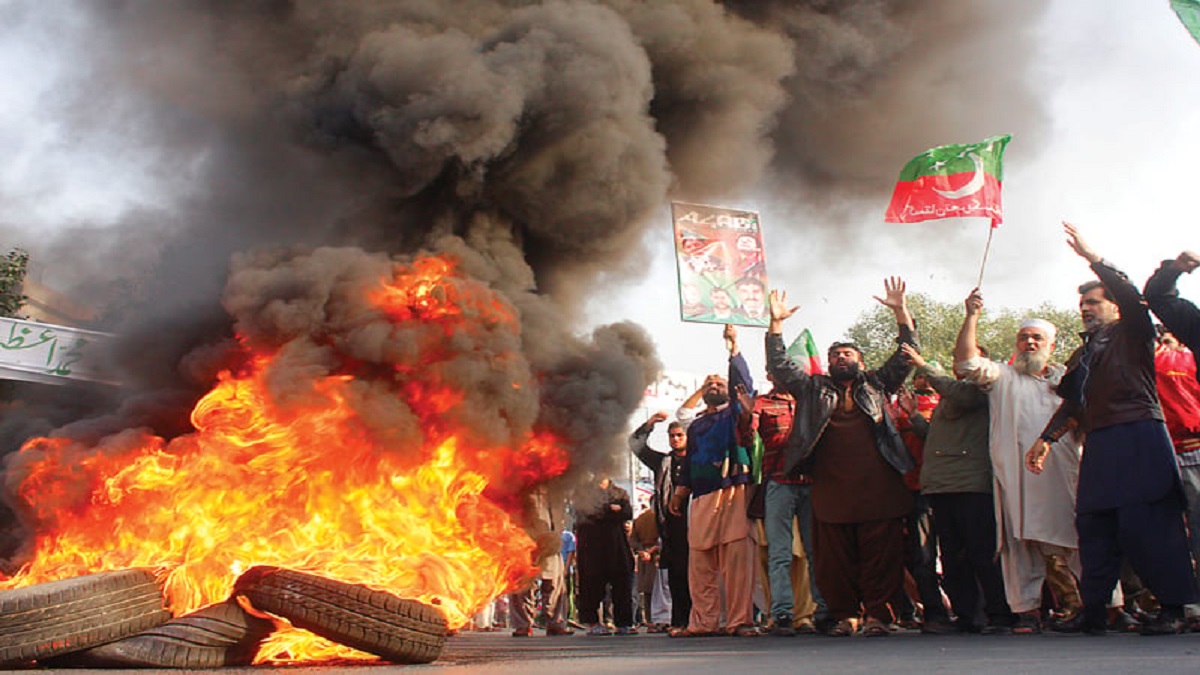The government has announced plans to invoke the anti-terrorism law against protestors who targeted civilian infrastructures, while those who vandalised military property will be tried under the Army Act.
Originally, the authorities had intended to charge all individuals involved in the post-arrest violent protest, led by PTI chief Imran Khan, under military laws. These plans, however, drew significant criticism from local and international groups, prompting the government to distinguish between cases.
Prime Minister Shehbaz Sharif made the announcement during a Sunday meeting. According to Sharif, those who attacked civilian infrastructures will face prosecution in anti-terrorism courts. Meanwhile, crimes involving military assets, such as the Corps Commander House, will be adjudicated under the Army Act.
The Prime Minister referred to May 9 as a bleak day in Pakistan’s history, alluding to the PTI affiliated miscreants who allegedly set the Corps Commander House in Lahore ablaze. He equated the event with the 2013 attack on Quaid-i-Azam Residency in Ziarat.
Sharif condemned Imran Khan and his followers, accusing them of inciting terrorism and violence that he considers to be against state interests. He drew parallels between the PTI and the outlawed Tehreek-i-Taliban Pakistan, following assaults on military properties.
Addressing the progression of legal proceedings against the rioters, Sharif assured that no individual involved in planning, instigating, or participating in vandalism would evade justice.
Read More: Federal Cabinet Approves Trial of May 9 Protesters Under Army Act
During a meeting to evaluate various legal aspects concerning the May 9 protests, Punjab Caretaker Chief Minister Mohsin Naqvi informed the attendees about the steps taken against the accused so far. The assembly concluded that perpetrators who damaged and set ablaze public property and infrastructure will be tried in anti-terrorism courts, whereas rioters who targeted military property will face military courts under the Army Act.
Prime Minister Sharif was also updated on cases being deliberated by the Supreme Court. While he emphasised that the arson attack on the Jinnah House would not be forgiven, he assured that no innocent person would face punishment.
Despite past setbacks, Mr Sharif expressed his determination to elevate the Pakistan Kidney and Liver Institute (PKLI) to an international standard similar to Johns Hopkins. His sentiments were conveyed through a series of tweets following his visit to the hospital.
Defence Minister Khawaja Asif clarified that no new military courts would be set up to try the rioters. Instead, existing courts under the Army Act would handle cases related to attacks on army buildings and installations.
The PML-N party voiced its eagerness to see the PTI leadership brought to justice. Senator Irfan Siddiqui expressed dissatisfaction with the delay in legal action against the culprits, urging for a swift response rather than mere rhetoric.



























